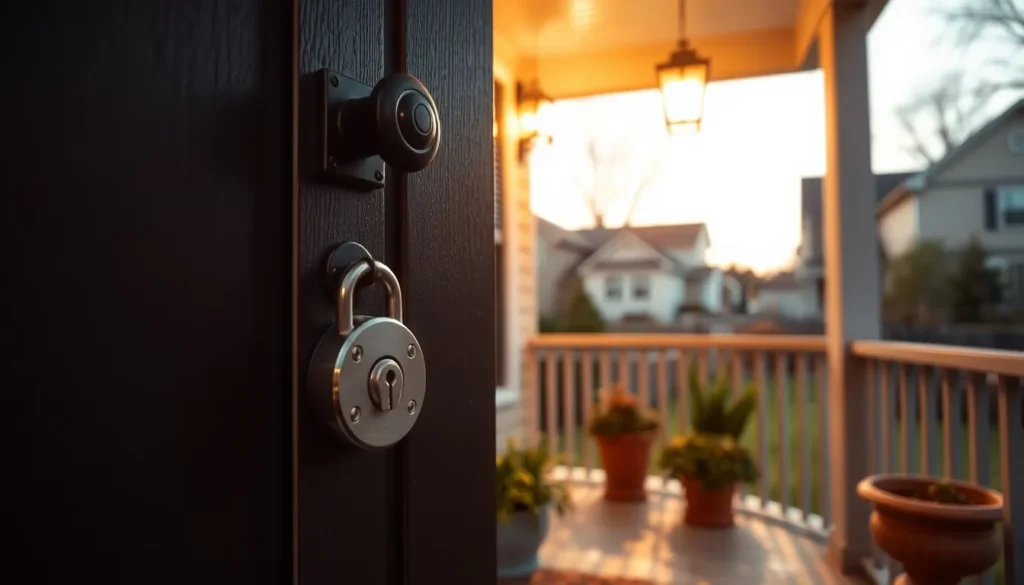In a world where even the most daring burglars are looking for an easy target, home security has never been more important. Picture this: a thief tiptoeing through your yard, only to trip over a garden gnome and make a hasty retreat. While that might make for a funny story, it’s better to ensure your home is a fortress from the get-go.
Table of Contents
ToggleUnderstanding Home Security
Home security encompasses various measures designed to protect residential properties from intrusions and theft. The risks associated with inadequate security can cause financial loss and emotional distress. Statistics show that homes without security systems are three times more likely to be burglarized.
Building a strong defense starts with physical barriers. Installing deadbolts, reinforced doors, and secure windows creates a first line of defense. Adding motion-sensor lights around entrances improves visibility and deters intruders.
Technology also plays a critical role in enhancing home security. Smart home systems allow homeowners to monitor their properties remotely. Security cameras can provide real-time updates and recorded footage. When combined with alarms, these systems can alert homeowners and authorities during a breach.
Neighborhood engagement further strengthens security. Forming or joining neighborhood watch groups fosters communication about suspicious activities. Sharing resources and tips among neighbors enhances collective vigilance.
Conducting regular safety assessments helps homeowners identify weaknesses. Checking for unsecured entry points and addressing overgrown landscaping can reduce hiding spots for burglars. Investing in outdoor security features like fences or gates adds another layer of protection.
Creating a security plan is essential for quick responses in emergencies. Each family member should understand the protocol for lockdowns or contacting authorities. Practicing drills can enhance readiness and reduce panic during real situations.
Overall, understanding home security means recognizing it as an ongoing effort. Committing to regular updates and adjustments ensures a stronger defense against evolving threats. By implementing these strategies, homeowners can create a safer living environment and protect their loved ones.
Essential Home Security Tips

Home security measures significantly reduce the risk of break-ins. Focus on strategies that reinforce the integrity of your home to keep your family safe.
Reinforcing Entry Points
Install deadbolts and consider reinforced steel doors to strengthen entry points. Use smart locks that offer keyless entry options for added convenience and security. Install peepholes to identify visitors before opening the door. Involve good lighting and landscape design that eliminates hiding spots for potential intruders. Secure the garage door and ensure all entry points are locked at night. Each layer of security contributes to deterring burglars.
Securing Windows and Doors
Secure windows with window locks and consider adding security film to make glass harder to break. Use window sensors that trigger alarms when opened without authorization. Install sliding door locks that prevent forcible entry. Utilize window coverings that obscure visibility to potential intruders. Regularly check the condition of weather sealing and replace worn or damaged components. Strong window and door security significantly enhances overall safety.
Implementing Alarm Systems
Invest in a reliable alarm system that includes monitored services for real-time alerts. Select systems equipped with motion detectors and glass break sensors to cover various vulnerabilities. Place signs and decals prominently to deter potential burglars from targeting your home. Choose smart home systems that allow remote access to monitoring features. Test the alarm system periodically to ensure it functions correctly. A robust alarm system acts as a critical component of comprehensive home security.
Outdoor Security Measures
Outdoor security measures play a crucial role in safeguarding residential properties. Homeowners can implement effective strategies to deter potential intruders.
Lighting and Landscaping
Bright lighting deters criminals by eliminating dark areas. Motion-sensor lights automatically illuminate paths and entry points, creating a safer environment. Strategic landscaping can also enhance security by trimming shrubs and trees to prevent hiding spots. Homeowners should consider placing lights near garages, driveways, and doors to increase visibility. Using timers for lights simulates occupancy, further reducing vulnerability when away from home.
Surveillance Cameras
Surveillance cameras act as visible deterrents against criminal activity. Installing cameras at critical locations, such as entrances and driveways, enhances overall security. High-definition models provide clear images, while cloud storage allows easy access to footage. Motion detection features alert homeowners of any suspicious activity in real time. Integrating cameras into smart home systems enables remote monitoring, ensuring peace of mind. Signs indicating surveillance presence deter potential burglars by showcasing proactive security measures.
Creating a Home Security Plan
Creating a solid home security plan involves thoughtful preparation and clear communication among all family members.
Involving Family Members
Involve family members in the security planning process for better compliance and awareness. Discuss roles each person will play during emergencies. Ensure everyone knows how to operate security systems, such as alarm panels. Encourage family members to identify potential vulnerabilities around the house. Training on simple safety habits, like locking doors and windows, builds a strong security culture. Make it a regular practice to review emergency contacts and escape routes. Engaging everyone enhances the overall effectiveness of the security plan.
Regular Security Audits
Conducting regular security audits helps identify and strengthen vulnerabilities. Schedule these audits at least twice a year for optimal results. Focus on checking locks, door frames, and windows for wear and tear. Evaluate lighting around entrances and pathways; ensure they are functioning and bright. Review footage from security cameras to spot any unusual activity. Test alarm systems to confirm they are working properly. Update the home security plan based on findings, keeping it relevant to evolving threats. Regular audits create a proactive approach to home safety, effectively reducing risks.
Prioritizing home security is essential in today’s world. By implementing a combination of physical barriers technology and community engagement homeowners can significantly reduce the risk of burglary. Regular assessments and updates to security measures ensure that homes remain protected against evolving threats.
Investing in a comprehensive security plan not only safeguards belongings but also provides peace of mind. With proactive steps and a focus on prevention homeowners can create a secure environment for themselves and their families. Taking these measures seriously is the best way to deter intruders and maintain a safe home.



